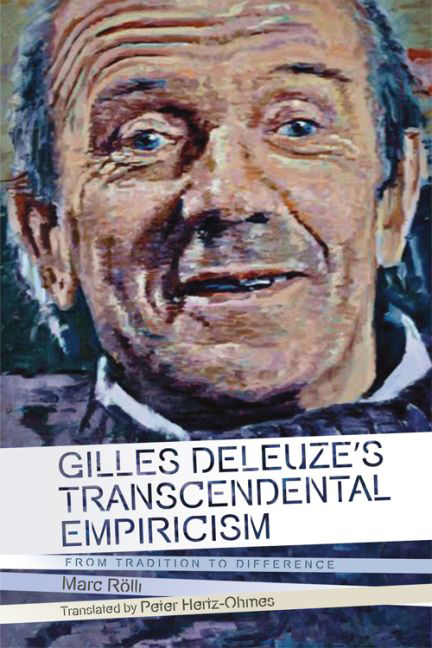Book contents
- Frontmatter
- Contents
- Translator's Note
- Author's Foreword
- Introduction: Can Empiricism Have a Transcendental Aspect?
- PART I EMPIRICISM/TRANSCENDENTALISM
- PART II FROM PHENOMENON TO EVENT
- PART III DELEUZE'S TRANSCENDENTAL EMPIRICISM
- 6 The Paradoxical Nature of Difference
- 7 Virtuality of Concepts
- 8 Subjectivity and Immanence
- Conclusion: Where Do We Go from Here? Lines of Flight
- Bibliography
- Index
8 - Subjectivity and Immanence
from PART III - DELEUZE'S TRANSCENDENTAL EMPIRICISM
Published online by Cambridge University Press: 27 April 2017
- Frontmatter
- Contents
- Translator's Note
- Author's Foreword
- Introduction: Can Empiricism Have a Transcendental Aspect?
- PART I EMPIRICISM/TRANSCENDENTALISM
- PART II FROM PHENOMENON TO EVENT
- PART III DELEUZE'S TRANSCENDENTAL EMPIRICISM
- 6 The Paradoxical Nature of Difference
- 7 Virtuality of Concepts
- 8 Subjectivity and Immanence
- Conclusion: Where Do We Go from Here? Lines of Flight
- Bibliography
- Index
Summary
The unfurling of immanence as the field of structure undercuts modern rationality insofar as the latter's unlimited claim to subjective autonomy and objective transcendence is concerned. On the plane of immanence no trace remains of the old presumption that one can profit from divine thought. The idea of immanence is critical of metaphysics and stands for a radically new empiricist beginning regarding experience. Clearly there isn't anyone who can feel or see or think as long as feeling, seeing and thinking are solely situated on the plane of immanence. Does Deleuze's conception make it necessary for us to wallow in abstractions or to assume unconscious events which must remain hidden from us – as subjects? Forces that we cannot recognise because we perceive only the surface of things? Hardly. The ideal synthesis of difference, that is to say, the structural constitution of purely immanent moments of experience, entails a coterminous second step involving the spatially and temporally determined actualisation processes of virtual constellations. There is no differential unconscious without disclosure or articulation, as Deleuze learned from Bergson or Lacan. In other words, world and expression cannot be considered in isolation from one another. Therefore the analyses on the idea of immanence are incomplete as long as its modes of actualisation are not addressed. That I will do in detail in the next subsections. Subjects are not simply given; they are produced or produce themselves. They result from multiple determinable processes of actualisation, called by Deleuze processes of ‘subjectless subjectivation’. Thus it is possible to work through the genealogy of subjectivity using an immanence-theoretical approach. I will first elucidate the ways of relating oneself to another, of becoming ‘subject’ or of having experiences by reflecting on the philosophical minefield of temporal structures. After that, in the second part of the chapter, I will introduce the category of intensity as the fundamental concept of empiricist philosophy, with whose help the temporal and spatial determinations of individuation can be made more concrete.
- Type
- Chapter
- Information
- Gilles Deleuze's Transcendental EmpiricismFrom Tradition to Difference, pp. 224 - 280Publisher: Edinburgh University PressPrint publication year: 2016



